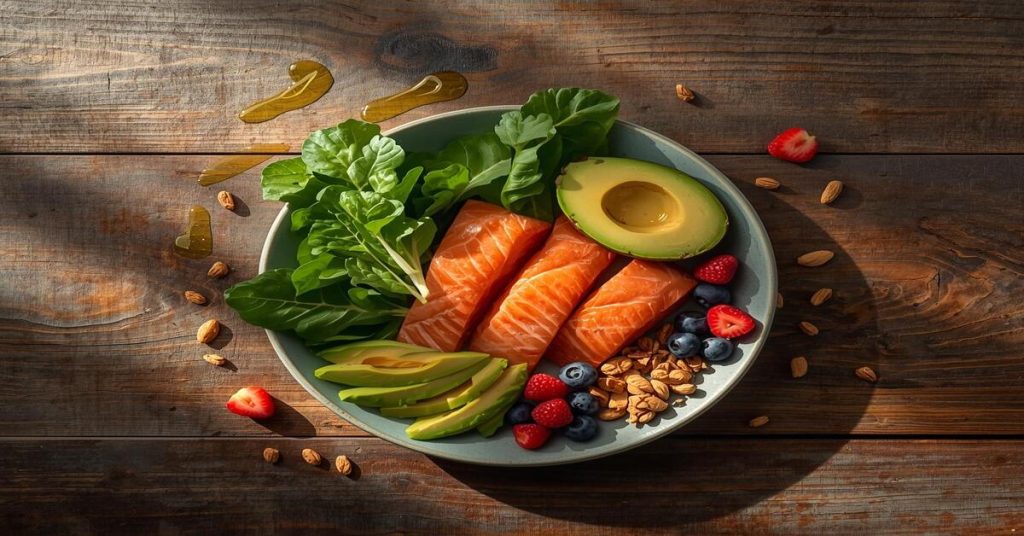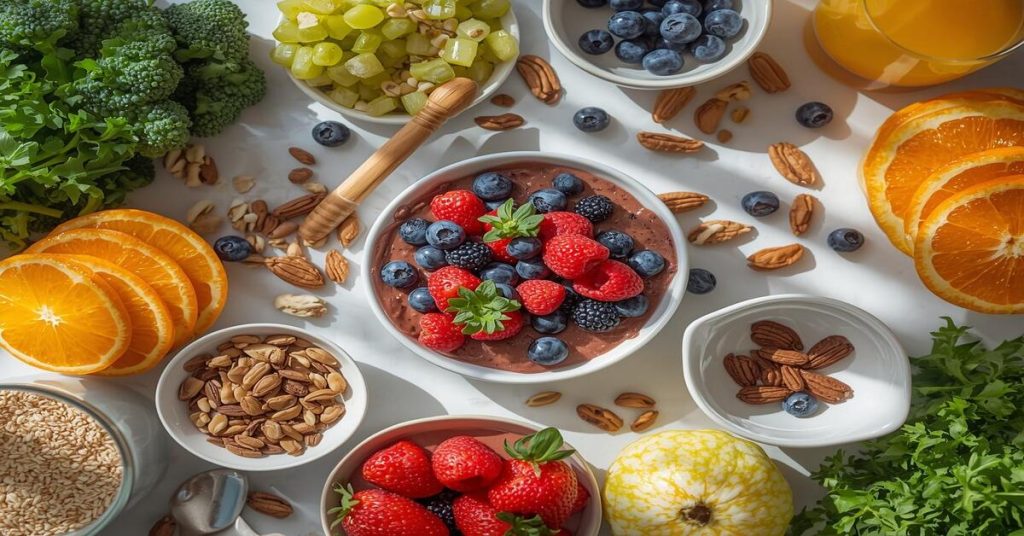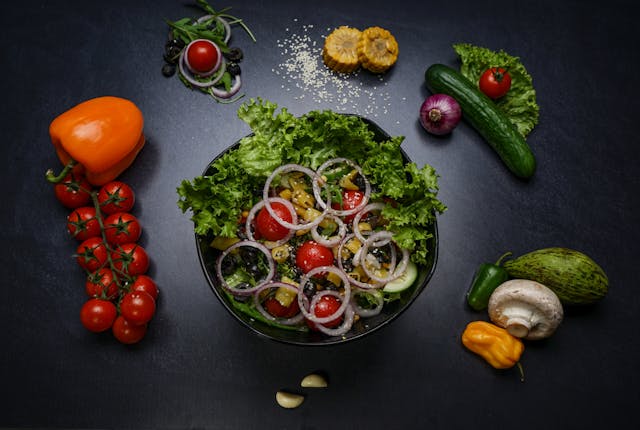10 Powerful Heart-Healthy Foods That Help Reverse Heart Disease Naturally ❤️
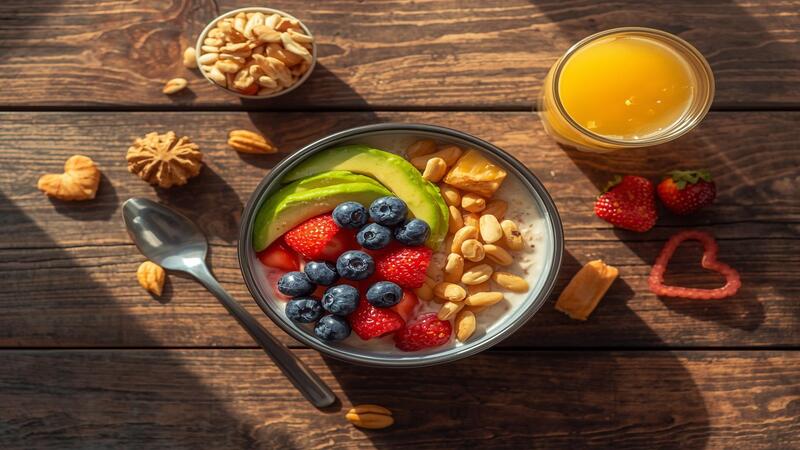
💚 A healthy heart is the foundation of a long, vibrant life. With the right diet and mindful habits, you can protect your heart naturally and even reverse early signs of heart disease. In this article, we’ll explore 10 powerful heart-healthy foods that not only taste amazing but also provide incredible benefits for your cardiovascular health.
Why Eating Heart-Healthy Foods Matters 💓
Your heart works tirelessly to pump life through your veins — so it deserves the best care possible. The modern diet, filled with processed foods and unhealthy fats, often contributes to high cholesterol, high blood pressure, and blocked arteries. The good news? Nature has provided us with delicious, nutrient-rich foods that can help prevent and even reverse heart disease.
How Nutrition Impacts Heart Health 🥗
Nutrition plays a crucial role in maintaining heart health. Certain foods are known to lower bad cholesterol (LDL), reduce inflammation, and improve blood circulation. By choosing a balanced diet full of heart-healthy foods, you’re taking an active step toward a stronger cardiovascular system. Let’s dive into the list of the top 10 heart protectors nature has to offer!
Read more: 15 Healthy Eating Habits to Boost Energy & Wellness 🌿
🥑 Top 10 Heart-Healthy Foods You Should Add to Your Diet
Here’s a closer look at the ten best heart-healthy foods that support your cardiovascular system, reduce cholesterol, and keep your arteries clean.
1. Avocados 🥑
Avocados are rich in monounsaturated fats, which help lower bad cholesterol and increase the good kind. They’re also packed with potassium — essential for maintaining healthy blood pressure levels. Regular consumption of avocados supports heart rhythm and reduces the risk of heart attacks. Try adding slices of avocado to your toast, salads, or smoothies for a creamy, nutritious boost!
2. Salmon 🐟
Salmon is one of the best sources of omega-3 fatty acids, which help reduce inflammation and decrease the risk of heart arrhythmias. These healthy fats also prevent plaque buildup in arteries, improving blood flow and lowering blood pressure. Consuming salmon twice a week can significantly enhance your heart’s performance and overall vitality.
3. Oats 🌾
Oats are loaded with beta-glucan, a type of soluble fiber that helps lower LDL cholesterol levels. Eating oats regularly can also stabilize blood sugar and improve digestion. A warm bowl of oatmeal in the morning is a simple yet effective way to include heart-healthy foods in your diet daily.
4. Berries 🍓
Strawberries, blueberries, raspberries, and blackberries are full of antioxidants called anthocyanins. These compounds protect your heart by reducing oxidative stress and inflammation. Berries also improve blood vessel function and support healthy blood pressure. Enjoy them fresh, frozen, or in smoothies for a sweet, heart-loving treat!
5. Leafy Greens 🥬
Spinach, kale, and collard greens are powerhouse foods for heart health. They are rich in vitamin K, which helps prevent artery calcification, and nitrates, which improve blood vessel flexibility. Regular consumption of leafy greens has been linked to a lower risk of heart disease and better overall circulation.
6. Nuts and Seeds 🥜
Almonds, walnuts, flaxseeds, and chia seeds are high in omega-3 fats, fiber, and plant sterols. They help reduce LDL cholesterol and support healthy arteries. A small handful of mixed nuts daily can provide a potent dose of nutrients your heart will thank you for. Just remember to choose unsalted, raw, or dry-roasted versions for maximum benefits.
7. Olive Oil 🫒
Olive oil is a cornerstone of the Mediterranean diet — one of the healthiest eating patterns in the world. Rich in antioxidants and monounsaturated fats, olive oil helps reduce inflammation and prevent plaque buildup in arteries. Use extra virgin olive oil for cooking or as a salad dressing to promote long-term heart health.
8. Whole Grains 🍞
Whole grains such as brown rice, quinoa, and whole wheat bread are packed with fiber, B vitamins, and essential minerals. They improve cholesterol levels and promote better digestion. Studies show that replacing refined grains with whole grains can reduce the risk of cardiovascular disease by up to 20%!
9. Garlic 🧄
Garlic has been used for centuries as a natural medicine. Its active compound, allicin, helps lower blood pressure, reduce cholesterol, and prevent blood clots. Consuming raw or lightly cooked garlic daily supports overall heart function and strengthens immunity. It’s truly one of nature’s most powerful heart-healthy foods.
10. Dark Chocolate 🍫
Dark chocolate (with at least 70% cocoa) is rich in flavonoids that improve blood flow, reduce inflammation, and enhance heart health. It also lowers stress levels, which indirectly benefits your cardiovascular system. Enjoy a small piece of dark chocolate daily — guilt-free — for both pleasure and heart protection!
Read more: Complete Guide to Healthy Eating and Nutrition for a Better Life 🍎
💖 Simple Lifestyle Tips for a Stronger Heart
- Exercise at least 30 minutes a day — even brisk walking helps.
- Get 7–8 hours of quality sleep every night.
- Manage stress through meditation or yoga 🧘♀️.
- Avoid smoking and limit alcohol consumption.
- Stay hydrated and maintain a healthy weight.
🌿 The Science Behind Heart-Healthy Foods
When it comes to building a strong heart, science clearly supports the power of heart-healthy foods. Studies have repeatedly shown that a balanced diet rich in fruits, vegetables, lean proteins, and whole grains can reduce your risk of cardiovascular disease by nearly 80%. These foods work in harmony to lower bad cholesterol (LDL), improve blood vessel flexibility, and support steady blood flow throughout the body. 🫀
Every time you choose a colorful plate of vegetables or swap fried snacks for a handful of almonds, you’re making an investment in your heart’s future. It’s not about restrictive dieting — it’s about nourishing your body with real, wholesome ingredients that your heart truly loves. ❤️
🍽️ How to Incorporate Heart-Healthy Foods Into Your Daily Routine
One of the biggest mistakes people make is thinking that eating healthy means making huge sacrifices. In reality, you can easily incorporate heart-healthy foods into your everyday meals with a few smart swaps and creative ideas. Try replacing refined carbs with whole grains, use olive oil instead of butter, and include fresh fruits or yogurt for snacks. These little adjustments gradually turn into powerful habits that transform your overall well-being.
For breakfast, you can start with oatmeal topped with berries and chia seeds. Lunch could include grilled salmon with quinoa and steamed greens. Dinner? How about a hearty lentil soup with a drizzle of olive oil? Each of these meals helps strengthen your heart while keeping your taste buds satisfied. 😋
💧 Hydration and Heart Health
Did you know that staying hydrated also supports heart function? Water helps your heart pump blood more easily and keeps your body’s circulation running smoothly. Dehydration can make your blood thicker, forcing your heart to work harder. Alongside eating healthy foods for heart , drinking at least 8 glasses of water daily can significantly improve your cardiovascular endurance and overall energy. 💦
🌞 The Role of Vitamins and Minerals in Heart Health
Your heart thrives on essential nutrients like magnesium, potassium, and vitamin C. Magnesium relaxes blood vessels, potassium balances sodium levels, and vitamin C strengthens blood vessel walls. These nutrients are naturally abundant in foods like leafy greens, citrus fruits, bananas, and whole grains. A diet rich in these minerals acts like daily protection for your arteries, preventing stiffness and oxidative stress. 🥝
🫶 Mindful Eating: The Secret to Sustainable Heart Health
Many people underestimate the power of mindful eating. Rushing through meals or eating out of stress often leads to poor digestion and overeating. When you slow down and focus on your food — noticing the flavors, textures, and aromas — your body processes nutrients more effectively. Combining mindfulness with heart-healthy foods ensures that you not only nourish your heart but also your mind. 🧘♀️
Next time you sit down to eat, take a deep breath, chew slowly, and appreciate the journey of each ingredient that made it to your plate. It’s a beautiful act of self-care and gratitude toward your body. 💖
🏃♀️ Exercise and Diet: A Perfect Duo for Heart Strength
While heart-healthy foods play a huge role in protecting your heart, pairing them with regular physical activity multiplies the benefits. Exercise helps improve blood circulation, burns excess fat, and enhances the heart’s pumping efficiency. Even 30 minutes of brisk walking, cycling, or yoga can make a massive difference. Together, food and movement become your most powerful medicine. 💪
🌸 The Emotional Connection Between Food and the Heart
Your heart isn’t just a muscle — it’s also deeply connected to your emotions. Stress, sadness, or anger can directly impact your cardiovascular health. Eating nourishing meals that bring you joy can help balance your emotional state and reduce the negative effects of stress. Sharing meals with loved ones, cooking at home, or simply enjoying a peaceful dinner alone can all improve emotional and heart health simultaneously. 🥰
Read more: “Balanced Nutrition for Daily Wellness: Your Complete Guide to Eating Right Every Day 🥗”
🥦 How to Build a Weekly Heart-Healthy Meal Plan
Creating a weekly plan helps you stay consistent with your heart-healthy foods. Here’s a simple pattern you can follow:
- Monday: Breakfast – Oatmeal with blueberries 🫐 | Lunch – Grilled salmon with greens | Dinner – Vegetable stir-fry with brown rice.
- Tuesday: Breakfast – Avocado toast 🥑 | Lunch – Chickpea salad | Dinner – Quinoa with sautéed spinach.
- Wednesday: Breakfast – Yogurt with walnuts | Lunch – Lentil soup | Dinner – Grilled chicken with olive oil drizzle.
- Thursday: Breakfast – Smoothie with kale and banana 🍌 | Lunch – Brown rice bowl | Dinner – Vegetable curry.
- Friday: Breakfast – Whole grain pancakes | Lunch – Tuna salad | Dinner – Baked sweet potatoes with garlic.
- Weekend: Mix it up — try new heart-healthy recipes or eat out smartly by choosing grilled or steamed dishes!
🕊️ Foods to Avoid for Better Heart Health
Just as there are foods that heal your heart, there are also those that harm it. Processed meats, refined sugar, fried snacks, and sodas are enemies of heart health. They cause inflammation, raise cholesterol, and clog your arteries over time. Reducing these from your diet doesn’t mean you can never enjoy your favorite treats — it simply means practicing moderation. Balancing the occasional indulgence with daily healthy foods keeps your heart strong and your lifestyle sustainable. ⚖️
🌿 The Power of Antioxidants in Heart Protection
Antioxidants are your heart’s invisible shield. They fight free radicals that damage cells and contribute to artery hardening. Foods like berries, green tea, spinach, and dark chocolate are rich in antioxidants. These nutrients slow down the aging process of your heart and promote long-term vitality. Think of every antioxidant-rich food as a little warrior defending your heart from within. 🛡️
💫 The Mediterranean Diet Connection
Among all dietary patterns, the Mediterranean diet stands out as one of the most effective for heart health. It emphasizes olive oil, fish, whole grains, legumes, and fresh produce. Studies show people following this diet experience 30–40% fewer heart attacks. Adopting even parts of this diet — like cooking with olive oil or eating more plant-based meals — brings you closer to the power of true heart-healthy foods. 🇬🇷
🧠 Heart and Brain: A Powerful Connection
Your heart and brain share an intimate connection through blood circulation. A healthy heart ensures your brain gets enough oxygen and nutrients. By consuming healthy foods for heart, you’re also protecting your cognitive health and reducing the risk of stroke, dementia, and memory loss. So when you eat for your heart, you’re actually nourishing your mind too! 🧠💓
🌼 The Long-Term Benefits of Eating Heart-Healthy Foods
Consistently eating heart-healthy foods doesn’t just protect you from disease — it transforms your entire quality of life. You’ll notice more energy, better mood, improved digestion, and glowing skin. The ripple effect of heart-focused nutrition reaches every organ of your body, enhancing longevity and happiness. 🌞
🌟 Nurturing Your Heart with Daily Choices
Small, consistent choices make a huge difference when it comes to heart health. By including heart-healthy foods in your daily meals — like colorful vegetables, fresh fruits, whole grains, and lean proteins — you give your heart the nutrients it needs to stay strong 💚. Even a handful of walnuts, a slice of avocado, or a serving of berries can support your cardiovascular system while satisfying your taste buds 🥑🍓.
🍃 Creating a Joyful, Heart-Focused Routine
The key to lasting heart health is building joyful routines around food. Cooking at home with natural ingredients, experimenting with herbs and spices, and savoring every bite makes eating a pleasurable, healing experience 🌿✨. Over time, these habits help you stay energetic, reduce stress, and feel more connected to your body. Every mindful meal reinforces the benefits of heart-healthy foods and strengthens your overall well-being 🫀💖.
🫀 Building a Long-Term Relationship with Heart-Healthy Foods
Maintaining your heart health isn’t about temporary diets or short-term challenges — it’s about creating a sustainable, enjoyable lifestyle 💚. When you make heart-healthy foods a natural part of your daily meals, you’re not only protecting your heart but also improving your overall quality of life. Start small by adding more colorful vegetables, fiber-rich grains, and omega-3-packed fish into your weekly routine 🥗🐟.
Remember, it’s not about perfection — it’s about consistency. Each time you choose fresh fruits over processed snacks or cook with olive oil instead of butter, you’re making a real difference for your heart ❤️. Combine these choices with regular exercise, good sleep, and stress management, and you’ll be amazed at how your energy levels rise and your mood improves over time.
The secret lies in balance — enjoying delicious meals that are both satisfying and nourishing. Make your kitchen a place of healing and creativity, where every bite supports a stronger heart and a happier you 🌿✨. Over time, your body begins to thank you with better stamina, clearer skin, and a healthier heartbeat — all thanks to your commitment to heart-healthy foods 🫶.
💭 A Gentle Reminder
Building a heart-healthy lifestyle is not about perfection — it’s about progress. Every time you choose a home-cooked meal over junk food, or take a 10-minute walk instead of scrolling endlessly, you’re showing love to your heart. Keep moving forward, one meal, one moment at a time. ❤️
Read more: Power Up Your Day with the Best Balanced Plant-Based Snacks for Mid-Day Energy
❓FAQs About Heart-Healthy Foods
1. What are the best heart-healthy foods for daily meals?
The best options include salmon, avocados, leafy greens, and oats. These provide essential nutrients to reduce inflammation and keep arteries clear.
2. Can heart-healthy foods reverse heart disease?
While diet alone can’t always reverse advanced heart disease, consistent intake of heart-healthy foods can repair damaged arteries, lower cholesterol, and significantly reduce risk factors.
3. How often should I eat heart-healthy foods?
Try incorporating at least one or two heart-healthy foods into each meal — like oats for breakfast, salmon for lunch, and leafy greens for dinner.
4. Are all fats bad for the heart?
No. Healthy fats like omega-3s and monounsaturated fats (found in olive oil, nuts, and avocados) are essential for heart function and should be included in moderation.
5. Can children also eat heart-healthy foods?
Absolutely! Encouraging kids to eat whole grains, fruits, and veggies early on helps them build lifelong healthy habits.
💬 Final Thoughts
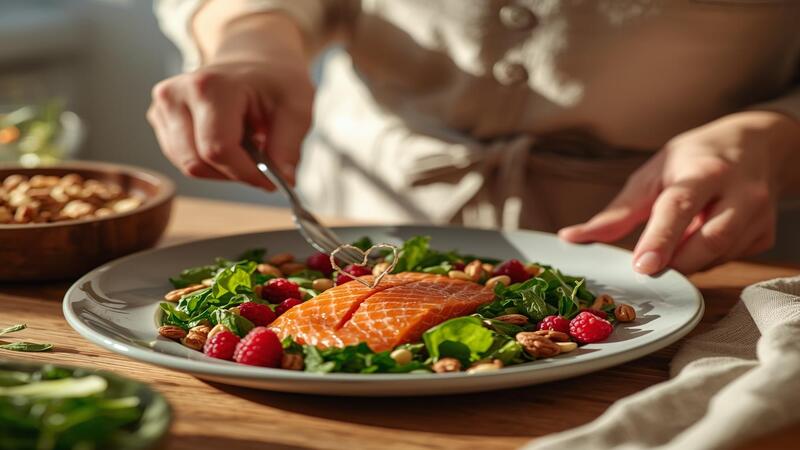
Your heart is your life’s engine — and every bite you take can either fuel it or damage it. By embracing these heart-healthy foods, you empower your body to heal naturally, stay energetic, and live longer. Remember, the journey to a healthy heart begins in your kitchen — so start today, one meal at a time! ❤️
For more tips on maintaining a balanced diet and overall wellness, check out these trusted resources:
- American Heart Association – Healthy Living – Explore expert advice on heart health, nutrition, and lifestyle tips to support cardiovascular wellness.
- British Nutrition Foundation – Healthy Eating – Find detailed guidance on building a nutrient-rich diet for optimal health and energy.
